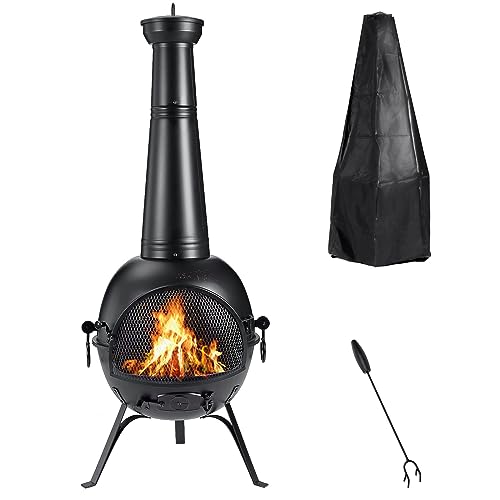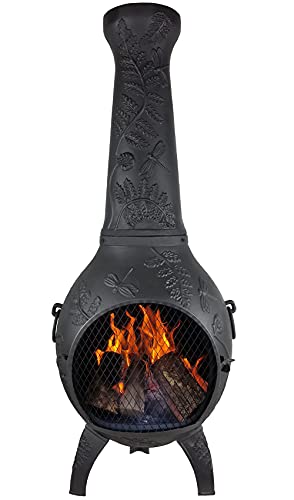20 Tips To Help You Be More Efficient With Chimineas Sale
페이지 정보

본문
 Things You Should Know Before Buying a Chiminea
Things You Should Know Before Buying a ChimineaChimineas can be a wonderful addition to your backyard. They add warmth and ambience. There are a few things you should consider before buying one.
 Some chimineas, for example, emit toxic particles into the air. You can prevent this by using eco-friendly fuels like bioethanol fire pits. They also require regular maintenance.
Some chimineas, for example, emit toxic particles into the air. You can prevent this by using eco-friendly fuels like bioethanol fire pits. They also require regular maintenance.The History of the Chiminea
Chimineas add warmth and a warm glow to outdoor living areas. Chimineas can turn a cold summer evening into a welcoming area to relax and entertain your family and friends. Chimineas were originally made from clay and other materials. They have changed over time to meet different aesthetic and practical requirements.
Typically, chimineas feature an oval shape and a chimney, however they also come in modern designs that have more of an open design. They are usually raised above the ground by the base, and have a large opening to add firewood. Some chimineas feature little or no exterior decoration, whereas others feature painted, incised or raised details.
The earliest chimineas were made out of fired clay and were designed for cooking and heating. As these structures became more popular, they were modified to accommodate different climates. The advancements in design and construction techniques made them more durable. Today, chimineas come in various metals, stones, and clays, each having their own aesthetic and functional advantages.
Depending on the type of chiminea you select It may require regular maintenance to ensure it is in good working order. For instance clay chimineas are prone to cracking and deterioration over time if they are not stored properly during the winter. Use a clay-specific sealant and reapply every 3 to 6 months to ensure maximum protection.
Metal chimineas are less prone to damage but can still be damaged if they are not stored properly. Place them in a case that will protect them against the elements, like rain and snow. Also, ensure that the chiminea is set on a level and stable surface to avoid it falling over. It should not be placed in the vicinity of trees or other structures such as a roof the patio.
Chimineas must be placed in their desired location and not moved too often since they are heavy and difficult to move. However, it is possible to move small clay chimineas around different areas of your garden or yard.
Their Functionality
Originally designed as functional cooking vessels for the town-dwelling Mexican tribes These outdoor fireplaces are perfect for creating a cozy atmosphere. They also function as practical heaters, spreading heat efficiently through their chimney systems. Their aesthetic versatility permits them to be incorporated into a broad variety of styles.
Chimineas are also simple to maintain and manage, which reduces the need for ongoing maintenance. They also can last longer when they are properly maintained and protected from harsh weather conditions. However, the quality of the materials employed and the maintenance methods employed by homeowners will determine their durability.
Chimineas are available in various materials, including traditional clay as well as cast iron and steel and all of them offer distinct durability and aesthetics. The latter, on the contrary hand, has a more refined and polished look that is suitable for contemporary designs. They also retain heat exceptionally well, enhancing their utility as Safavieh Cartagena Silver & Black Outdoor Chiminea heaters. Furthermore, they are constructed out of sustainable materials, giving an alternative to relying on fossil fuels.
The impact of chimineas on the quality of air depends on factors such as the duration of use, the type and moisture content of the wood, and the effectiveness of the chiminea's design. Nevertheless, these units emit particles that can be detrimental to human health, and contribute to the pollution of the air and causing climate change. Choosing dry, well-seasoned wood and implementing efficient chiminea design can significantly reduce this effect.
Chimineas are enclosed structures that reduce the amount of smoke produced. They are also designed in a way that smoke is directed upwards to minimize the risk of health issues and nuisances for neighbours. The open design of firepits can cause a lot of smoke that can affect living spaces.
In the end, the decision between a chiminea and a fire pit is based on your personal preferences, the functionality of the fire pit and budget. Both are incredibly versatile and have a distinctive design however chimineas are a excellent option for those who want to create a cozy atmosphere with little effort. They are also simpler to manage after they have heated up due to their specialised design, which makes them a great alternative to outdoor Fireplaces and Stove.
Materials
Chimineas come in various styles that can be adapted to any taste. They usually have the base of a potbelly that tapers to a chimney and are designed in clay, metal or cast iron. They're a wonderful addition to any deck or patio that you have in your backyard. They can provide lighting and ambiance while providing warmth, allowing you to spend more time outside. Chimineas can be used instead of fire pits since they are more appealing and better at directing smoke away from people sitting around them.
Clay chimineas are made by hand, using clay from the area. They are then fired in a kiln to slash off any excess materials and form a hard, water resistant surface. They are then coated with an anti-corrosive glaze to minimize the chances of cracking and warping. Chiminesas can be kept outside year-round, except in bad weather. If it is stored outside should be covered and secured with a chiminea cover to stop the clay from getting wet.
Whether made from clay or metal, or cast iron, a chiminea can give a stylish, rustic style to your patio. They are made to withstand extreme temperatures, which makes them suitable to cook on, and they are available in a variety of sizes. Some come with a removable BBQ.
Be sure to verify whether the chiminea is safe for use and has adequate ventilation prior to you purchase one. It is essential to keep it on a nonflammable surface, like concrete patios or bricks. It should not be placed on an overhang, such as pergolas or roofs. It is also essential not to make use of water to smother the flames because the sudden change in temperature can crack clay and terracotta, and also damage metal.
While chimineas are made to endure temperatures in the outdoors, they should be gradually built up, beginning with small fires, and increasing the size of the fire gradually. To avoid rust and ash buildup, it is a good idea for you to regularly clean your chiminea by using an outdoor wood cleaner.
Environmental Impact
Chimineas are well-known for adding warmth and atmosphere to outdoor living spaces, but there is concern that their use creates harmful gases. Carbon monoxide is released when wood is burned in chimineas. This dangerous gas is not odorous or colorless and can cause respiratory problems and other medical conditions.
Gases like this can build up within enclosed structures such as Chimineas and eventually reach toxic levels. Carbon monoxide poisoning could lead to unconsciousness or even death. It also contributes to air pollution and global heating and is the reason chimineas should be kept outdoors and away anything flammable.
In addition to carbon monoxide, chimneys can release particulate matter and other harmful pollutants. The size of the chimney as well as the type of fuel used are both factors in this and dry wood fuels producing less emissions than wet logs. A chiminea fitted with a spark resistor will cut down smoke and PM2.5 emissions.
Although chimineas have evolved over the years but their basic design- a pot-belly base and an elongated chimney -remains the same. This balance between aesthetics, preservation, and innovation is what has made the chimineas so beloved in Europe and beyond.
Modern chimineas can be found in various designs and materials that can be customized to any garden design. Metal chimineas are more durable and resistant to weather than clay chimineas, which are still popular. They are made of cast iron or cast aluminum, and even stainless steel. They can be shaped in a range of styles to meet different preferences.
There are also slim and linear designs that don't hinder performance. It is important to note that a model made of metal will require more care and maintenance as in comparison to clay models because it will be subject to thermal shock every time it is lit.
When you are choosing a chiminea it is recommended to study the manufacturer's guidelines carefully before igniting a fire. It is also an excellent idea to buy a cover for your chiminea when it is not in use to prevent any water damage or the buildup of dust. It's also important to regularly clean your chiminea and clear any ash before constructing the fire again.
- 이전글Collapsible Mobility Scooter Tools To Enhance Your Daily Life 24.09.20
- 다음글10 Chimineas For Sale That Are Unexpected 24.09.20
댓글목록
등록된 댓글이 없습니다.

